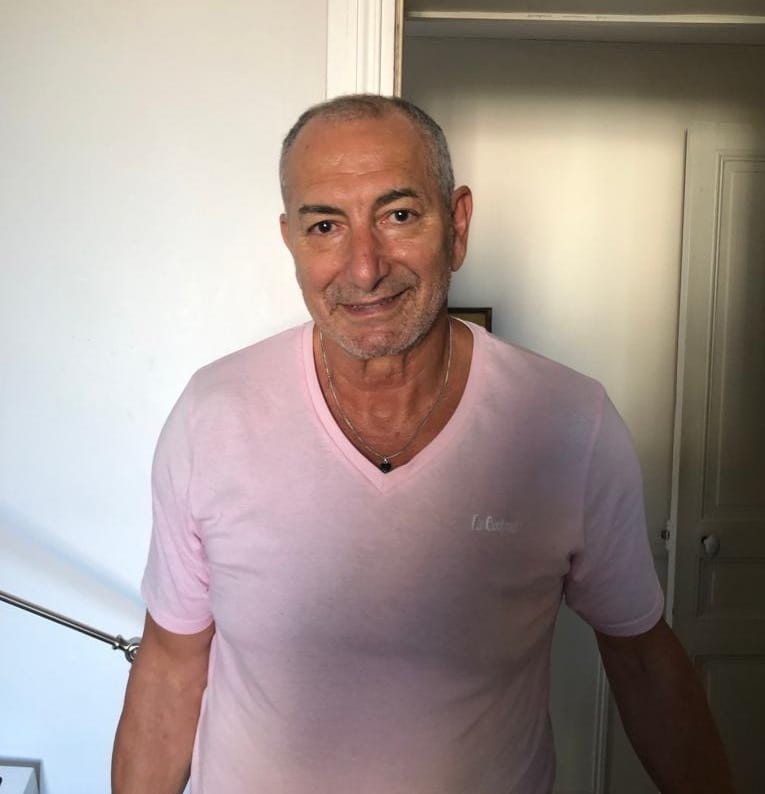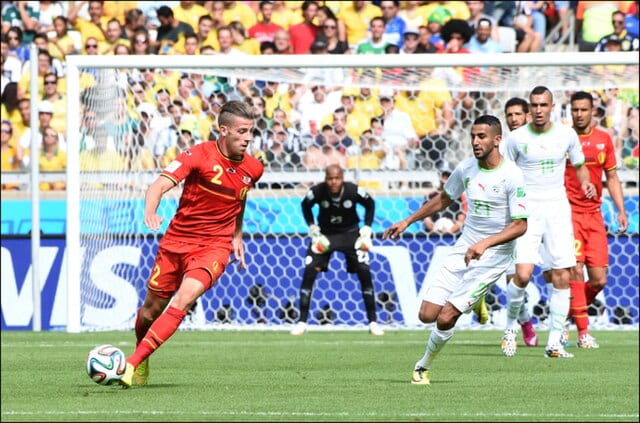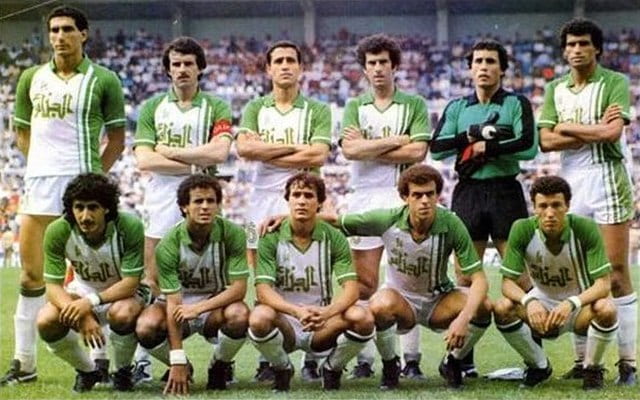The Beautiful Game: Dispatches From the Hill has mandated that Fabien Bellaiche (brother of Laurent Bellaiche) to interview a former international soccer player, Nordine Kourichi. We would like to express our gratitude to both Fabien and Nordine (who are good friends) for this interview that we hope you will find interestingand which has been translated from French to English.
Nordine Kourichi is a former footballer who played as a defender. Born in France, he played for the Algeria national team. Kourichi was an important member of the Algerian national team at the 1982 FIFA World Cup in Spain and the 1986 FIFA World Cup in Mexico, starting five out of the six games.
Hello Nordine, where does your nickname “the Giraffe” come from?
It was Jean-Michel Larqué, the former captain of Saint-Etienne and later journalist, who in the French magazine Onze-Mondial in the 80s, called me that because, in our Bordeaux team, we had the smallest player in the championship (Alain Giresse with 1m 65) and me, the tallest player (along with Jean-Paul Bertrand-Demanes from Nantes) at 1m93. This article was popular, and the nickname stuck with me.
Who is the best player you have played with?
The player with whom I had the most of an affinity with is the immense Marius Trésor. He was already my idol when I was in the training center at Valenciennes. Marius played at Ajaccio and then at OM (Olympique de Marseille) and I was in awe of him. Playing with him in Bordeaux was wonderful. He gave me plenty of advice. Furthermore, we lived in the same residence (Koderan) with Jean Fernandez and Aimé Jacquet. We were together all the time playing poker in some evenings among other memorable moments. This created a bond, an alchemy that could be seen on the pitch. Moreover, our qualities were complementary in central defense, him as the sweeper and me as the stopper.
The Best player? Of course, Gigi (Alain Giresse). He had a great intelligence on the field, had a high tactical QI, and was a real metronome. Bernard Lacombe (the French top goal scorer in the French championships with 255 goals) owed him a lot of goals. Gigi was someone very talented, passionate and meticulous. At Bordeaux, it was also the time when I was at the top of my career. I had signed there for four years, and I made a small mistake by leaving early to go to Lille but financially there was no comparison between Lille and Bordeaux.
Who was your strongest opponent?
Nenad Bjekovic, a brilliant Yugoslav striker who played in the French championship with Nice. He was the most impressive center forward, and a rigorous, technical and very skillful player in front of the goal. In second, I would put Vahid Halilhodžić. For 10 years, every match between us was like a war (with spitting, headbutt, etc.). The first match that Vahid played in France was Nantes against Bordeaux. I was marking him and I was quite rough. It left its mark . . . Didier Couécou told me to watch out for this Yugoslav player. I did not give up and was tough with him. I even took a yellow card after 15 minutes when I conceded a foul that made him fly at least two meters. Nantes won 3-2 but he did not score. I had succeeded in defeating him.
What is funny is that when he became coach of Algeria for the 2014 World Cup, he was looking for an assistant. . . .and called me. This is how I became assistant coach at the Brazilian World Cup. A nice guy, this Bosnian man.
You were one of the first dual nationals to play for Algeria. How was that seen?
I was even the first binational player born in France to play for Algeria and I feel great pride in that. Please read a book by Stanislas Frenkiel who lives in the North of France, and that is called Immigrant Football. I owe a lot to my father who came to France in 1949 (I was born in 1954) to be a miner 10 km outside of Lens. Without that, I would never have had this career.
The reception was positive because in fact we were better than the local players. So, there was no jealousy. The press knew it and helped us. At the time Algeria had never qualified for a World Cup. We thus brought added value as we will see later. So, there was a great feeling of shared spirit and great results thanks to the dual nationals trained in France.
I would also like to thank France where I learned everything and for whom I have deep gratitude. I have spent my entire career in France. I also consider myself French. Thanks to this sporting choice, I was also able to discover and know better the African world, Africa with the CAN (Coupe d’Afrique des Nations, which translates as The African Cup of Nations) and international matches for example.
Do you have any regrets about your career?
No, as I told the 2014 generation at the World Cup in Brazil, there is nothing worse than having regrets. I gave them a speech with my experience of the 1982 and 1986 World Cups and 1984 CAN. I told them that there is nothing more beautiful than playing in the World Cup. They must have no regrets; They must give everything at each minute. They must pay attention to everything: lifestyle, sleep, food, recovery, etc. But today’s generations are no longer the same as in our time and certainly listen less. As for me, I really have no regrets, I played the World Cup, the CAN and the European Cup with Bordeaux.
Was there a match where you felt invincible?
Algeria-West Germany at the 1982 World Cup. Horst Hrubesch, who I had known before (I had played with Bordeaux in the European Cup against him and Hamburg) did not score. It was the pinnacle for me in the World Cup. I did everything well and moreover it was a very prestigious match.
Which coach had the biggest impact on you?
Aimé Jacquet had a very important quality: he listened to the players. It was his form of intelligence. He learnt a lot and quickly from his players. There were a lot of discussions between him and his two leaders, Lacombe and Giresse, and not just about tactics. I really liked his human management side; he knew how to manage his group perfectly.
What is the strongest team you have faced?
One of my first professional matches was against the great St. Etienne of 1976, and they played really well. I had to guard Dominique Rocheteau. I was not there to just have fun but to prove that I had my place. In the duels, I hit him with some blows. I was aggressive, but never had a single red card in my entire career. Rocheteau typically played with his back to the goal, and I hit him from behind. I felt a little bit sorry for him at the end of the match.
Could you have joined other teams?
When I left Valenciennes in 1981 after four professional seasons, Bordeaux, Metz, Sochaux and even Verona in Italy wanted me. However, Aimé Jacquet called me personally and told me that he was counting on me and that I would start on defense. A very good choice on my part. I should not have left Bordeaux so quickly but the offer from Lille was tempting and I was afraid of playing less because Bordeaux was in the process of acquiring new players in central defense.
Now let’s move on to the masterpiece of your career: the 1982 World Cup.At that time, there were only two qualified African nations in the World Cup.Tell us about the qualification.
It was super difficult since just two teams could qualify. Imagine two teams for an entire continent with teams like Cameroon, Nigeria, Egypt, Tunisia, etc. We easily beat Sudan then Zambia and then came the decisive match against the big favorite, Nigeria. We arrived in Lagos, with Nigeria at that time being a country of 120 million inhabitants with violence everywhere, and where the police many times cut off the hands of thieves without trial. However, we felt strong with the support of dual nationals like me. We had confidence in ourselves, in front of 120,000 people in the stadium. Nigeria was undefeated for 5 years and we won 2-0. That was completely crazy! The return leg in Constantine went like a dream: 2-1 for us. Algeria qualified for the World Cup for the first time, and we were considered as kings. I’ll let you imagine the party in the country and more precisely in Constantine.
Did the preparation for the World Cup go well?
We had very good preparation. We alternated matches against nations (Peru, Ireland) and clubs (Manchester, Real Madrid, Juventus, Fluminense). We won a lot of these games. A group with a great state of mind was being created and confidence grew. We realized at that moment that a team had just been born. It forged such confidence in us. Even I, who was tired from my long season with Bordeaux (the championship, the French Cup, the European Cup) worked hard during this preparation.
What was the mindset just before the match against West Germany?
Many German players looked down on us and upset us during interviews. Hrubesch said that it is more like a friendly match that they would win 5-0. Karl-Heinz Rummenigge stated that he would dedicate the 6th goal to his son. Derwall, then coach of Germany, said that he’d walk back home if West Germany loses, etc. It over-motivated us and gave us a boost. Furthermore, as already mentioned, we had confidence in ourselves. Here is a little anecdote: I shared the room with Mustapha Dahleb (who is considered as one of the best players of all-time for PSG), and a month before the match I had put up a poster of the German team on a wall. Every evening and morning I walked towards this poster and looked at Hrubesch in the poster and said: we are almost June 12, and you are going to be surprised my friend. It was a great motivation.
What about the game by itself?
In the first half, we lacked a little self-confidence since West Germany was an ogre, being the reigning European champion and having a player who had won the Golden ball twice (Rummenigge). We were impressed. Then we started to play our football (that is, playing very quickly with a single touch of the ball) to avoid the German bulldozer from crushing us. We had a good quality of movement and rhythm with the ball. We were gaining more and more confidence in ourselves with great counter attacks. We had Assad, Dahleb, who was the prince of the Parc des Princes where Paris Saint-Germain played, at the heart of the game, with only creative players around them. If someone watches the match again, one can see that we played with only three defenders, since the right back, Merzekane, played in a winger position and Fergani had a great, very technical match. I repeat that we played with many technical players such as Dahleb, Belloumi, Assad, Madjer, and no defensive midfielder. In the second half, we scored the first goal which increased our confidence. On this goal, 11 passes happened without the opponent touching the ball. We wanted to continue to play like this, by using our technical skills. Most of the time, our one-touch game unsettled the German players. They still equalized five minutes later by Rummenigge. We were wondering what to do because a 1-1 tie against West Germany was already a very good result, but we wanted to continue playing with our qualities. 15 minutes later we scored the second goal and used our whole strength to maintain this winning score.
What was the coach’s speech at halftime?
A very technical and tactical analysis with a lot of perspective. He said that we were on the right path, and we needed to continue like this. Our two leaders, Dahleb and Fergani, also spoke to motivate us.
What about the game now called the disgrace of Gijon?
I went to the stadium to watch this West Germany-Austria game at the 1982 World Cup with Daniel Hechter (the French fashion designer and president of PSG from 1974 to 1978) and Dahleb. I am going to set the record straight. These two teams did not like each other and if Austria had been able to score against West Germany at the start of the match they would have done so. However, Hrubesch scored first, and stress developed on each side. Since they were both qualified with a 1-0 win for West Germany, why take risks and get eliminated? So, they just decided to pass the ball around for 75 minutes and no one really tried to score anymore. German and Austrian fans burned their flags in anger. There were between 2,000 to 3,000 Algerian spectators at the stadium, and they burned money bills while shouting that a robbery has happened. Since that game, all matches in the last round of any Word Cup are played at the same time to avoid this disgrace.
How was the return to Algeria?
Algeria in 1982 was a young country, that is, only 20 years old. It was a developing country. We were able to give the Algerian people their first euphoria, their first joy. A manifestation of happiness in all areas. All of Algeria was outside applauding us on the day of our arrival. It took us four hours to reach the presidential palace from the airport. There were so many people outside. It was so crowded.
We were rewarded at the palace: a large bowl awaited us with folded pieces of paper inside.
Each player drew lots for their gift. When I pulled mine, it was written that I won a . . .fridge. You must realize that a fridge in Algeria in 1982 was more than just luxurious. Here is my reward for the World Cup: a fridge!





